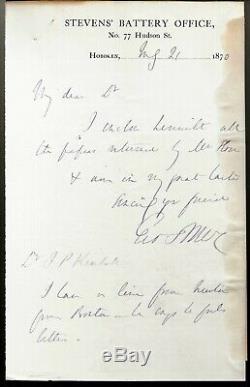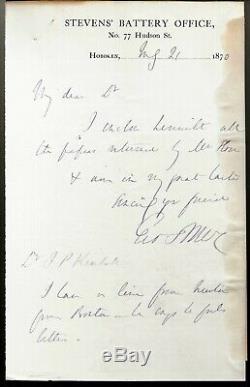
- Index
- Framing
- Material
- Photo Type
- Size
- Subject
- Americana (17)
- Andrew Jackson (4)
- Civil War (40)
- Collectible (10)
- Figures & Portraits (8)
- Historic & Vintage (3)
- History (59)
- Law & Government (3)
- Literature & Fiction (7)
- Men (7)
- Men, Civil War (18)
- Men, Military (16)
- Military (34)
- Military & Political (69)
- Military & War (171)
- Military, Political (3)
- Portrait (5)
- Presidents (3)
- Tree (2)
- United States (2)
- ... (2407)
- Unit Of Sale
Civil War General George McClellan ALS to Former Major James P Kimball 1870




ALS by former Commander of the Union Army George McClellan to a former staff officer James P Kimball on the Stationary of Stevens Battery Office. Kimball was born in Salem, Massachusetts on April 26, 1836.
[1] In 1854, he entered the Lawrence Scientific School of Harvard University; after a year he traveled to Berlin to study at the Friedrich-Wilhelms-Universität; he then transferred to the Georg-August-Universität in Göttingen, receiving a Ph. [1] He then enrolled in mining studies at the Technische Universität Bergakademie Freiberg in Freiberg, Saxony. [1] As Whitney's assistant, Kimball participated in the geological surveys of the lead mining regions of Wisconsin, Illinois, and southeastern Iowa. When the New York State Agricultural College (later merged into Cornell University) was founded in Ovid, New York, Kimball became Professor of Chemistry and Economic Geology. [1] With the outbreak of the American Civil War in 1861, the college's president, Maj. Patrick was appointed Brigadier-General of Volunteers; Kimball became Brig.Patrick's Chief of Staff, with the rank of Captain. [1] He saw field service under Maj. Irvin McDowell, and was present at the Second Battle of Bull Run (August 2830, 1862); the Battle of Chantilly (September 1, 1862); the Battle of South Mountain (September 14, 1862); the Battle of Antietam (September 17, 1862); the Battle of Fredericksburg (December 1115, 1862); the Battle of Chancellorsville (April 30-May 6, 1863); and the Battle of Gettysburg (July 13, 1863).
Patrick was then appointed Provost Marshal of the Army of the Potomac, and Capt. Kimball accompanied him there, serving on the General Staff under Generals George B. McClellan, Ambrose Burnside, Joseph Hooker, and George Meade successively.When the army went into winter quarters, Kimball resigned to resume his life as a mining engineer based in New York City. [1] During the 1860s and 1870s he investigated coal and iron mines in Pennsylvania, and silver mines in Chihuahua, Mexico, west Texas, and Utah. He also made recommendations on plant designs, based on European metallurgical practice. After his marriage in 1874, he became an honorary professor of Lehigh University, Bethlehem, Pa. And relocated there, while his professional office remained in New York City.
He was among the first American geologists to inspect and write about the mineral resources of Cuba and South America. He became president of the Everett Iron Company, which played a major role in developing mines in Bedford County, Pennsylvania in 1883-84. In 1885, President of the United States Grover Cleveland named Kimball Director of the United States Mint and Kimball held that office from July 1885 until October 1889.
He is best known for his report criticizing the quality of the coinage, which led to improvement in mint equipment. He later served on the annual "Assay Commission" appointed by the President to ensure quality in coinage.
During the 1890s-1900s he resumed his consultant business in New York City. By 1902, he had helped develop the coal fields of Red Lodge, Montana, where he relocated late in life with his son's family. Upon his death the respected Mining & Scientific Press of San Francisco called him "one of the pioneer mining geologists of America" and one who left a record of clean honorable work. Kimball married Mary Elizabeth Farley July 22, 1874 in Cambridge, Massachusetts They had three children: Russell, named after a Revolutionary era ancestor, Edith, and Farley.
Kimball died in Cody, Wyoming October 23, 1913. George Brinton McClellan (December 3, 1826 October 29, 1885) was an American soldier, civil engineer, railroad executive, and politician. A graduate of West Point, McClellan served with distinction during the Mexican War (18461848), and later left the Army to work in railroads until the outbreak of the Civil War (18611865). Early in the war, McClellan was appointed to the rank of major general and played an important role in raising a well-trained and organized army, which would become the Army of the Potomac in the Eastern Theater; he served a brief period (November 1861 to March 1862) as general-in-chief of the Union Army.
Although McClellan was meticulous in his planning and preparations, these very characteristics hampered his ability to challenge aggressive opponents in a fast-moving battlefield environment. He chronically overestimated the strength of enemy units and was reluctant to apply principles of mass, frequently leaving large portions of his army unengaged at decisive points. McClellan organized and led the Union army in the Peninsula Campaign in southeastern Virginia from March through July 1862.
It was the first large-scale offensive in the Eastern Theater. Making an amphibious clockwise turning movement around the Confederate Army in northern Virginia, McClellan's forces turned west to move up the Virginia Peninsula, between the James and York Rivers landing from the Chesapeake Bay, with the Confederate capital, Richmond, as their objective. Initially, McClellan was somewhat successful against the equally cautious General Joseph E.
Johnston, but the military emergence of General Robert E. Lee to command the Army of Northern Virginia turned the subsequent Seven Days Battles into a partial Union defeat.
General McClellan failed to maintain the trust of President Abraham Lincoln. He did not trust his commander-in-chief and was privately derisive of him. He was removed from command in November after failing to decisively pursue Lee's Army following the tactically inconclusive but strategic Union victory at the Battle of Antietam outside Sharpsburg, Maryland, and never received another field command. McClellan went on to become the unsuccessful Democratic Party nominee in the 1864 presidential election against Lincoln's reelection. The effectiveness of his campaign was damaged when he repudiated his party's platform, which promised an end to the war and negotiations with the southern Confederacy.He served as the 24th Governor of New Jersey from 1878 to 1881, and eventually became a writer, and vigorously defended his Civil War conduct. Most modern authorities have assessed McClellan as a poor battlefield general. Some historians view him as a highly capable commander whose reputation suffered unfairly at the hands of pro-Lincoln partisans who made him a scapegoat for the Union's military setbacks. After the war, subsequent commanding general and 18th President Ulysses S.
Grant was asked for his opinion of McClellan as a general; he replied, McClellan is to me one of the mysteries of the war. The item "Civil War General George McClellan ALS to Former Major James P Kimball 1870" is in sale since Tuesday, March 12, 2019. This item is in the category "Collectibles\Militaria\Civil War (1861-65)\Civil War Veterans' Items". The seller is "civil_war_photos" and is located in Midland, Michigan.
This item can be shipped worldwide.
